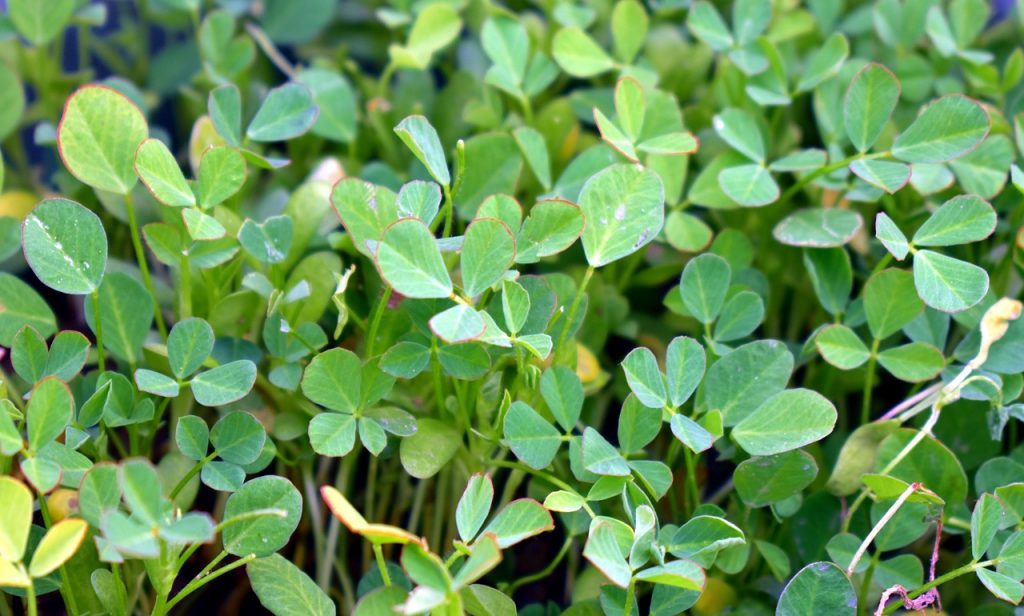Updated December 10, 2020 by Sanusi Umar MD
Fenugreek is an herb with small pods that contain tiny brown seeds. It tends to grow in warm climates in different parts of the world such as North America, Egypt, India, and the Middle East. Fenugreek has been used in traditional medicine since ancient times due to its antimicrobial, anti-inflammatory, anti-diabetic, and anti-tumor properties. Modern science is now starting to find evidence to support the use of fenugreek for hair. This herb may be able to enhance the health and growth capabilities of hair follicles.
Should Men and Women Consider Fenugreek for Hair Follicle Health? What Researchers are Finding

Modern science is studying the possibility of using fenugreek for hair follicle health through the design of controlled research experiments
Fenugreek seeds have a rich concentration of nutrients and elements that benefit the hair follicles. Researchers are shedding light on how fenugreek can help promote healthier hair. And they are discovering some optimistic findings.
Research Study That Supports the Use of Fenugreek for Hair Growth in Humans

In a study by Schulz C, Bielfeldt S, Reimann J., researchers tested the efficacy of Fenugreek extract and various micronutrients as a potential treatment for hair loss (1). This research involved 60 volunteer participants (i.e. 30 men and 30 women) who displaced early to moderate stages of hair loss. They ingested capsules containing fenugreek extract and other micronutrients, twice a day. The experiment lasted for 6 months.
A group of subjects received a placebo. In this double-blind study, neither the researchers administering the treatments nor the participants knew whether the capsules contained the placebo or the combination of ingredients that included fenugreek.
Every two months, the researchers examined the participants for signs of hair growth and collected data on their findings. Their methodology included questionnaires, a dermatological assessment, and a phototrichogram image analysis.
At the conclusion of the clinical trial, the researchers found a significant improvement in hair loss. They also noticed a greater number of follicles at the anagen stage. Within the group of subjects treated with fenugreek, 82.9% reported a positive and noticeable difference in hair volume and thickness. Also, 74.3% reported better resistance to hair shedding. The placebo group showed no changes.
The researchers believe that fenugreek increases blood flow to the skin’s surface. Also, fenugreek contains rich stores of steroid saponins. These compounds act as DHT inhibitors.
A Study on Fenugreek for Hair Growth in Mice
In one study, by Purwal L, Gupta SPBN, Milind Pande S, researchers wanted to investigate the possibility of finding a natural hair loss treatment as an alternative to minoxidil, a synthetic topical drug that is associated with various dangerous side effects (2).
They developed an herbal formulation that contained several plant extracts. One of these herbs included Fenugreek. The researchers tested various concentrations, ranging from 1-10% by applying the mixture onto the shaved backs of healthy male rates.
The research team found that the 7.5% concentration level produced the best improvement in hair growth. Upon closer observation, they noted an increase in the size of the hair follicles. Secondly, they observed that the treatment extended the duration of the anagen phase.
This performance was comparable to the 2% concentration level of minoxidil.
Based on their findings, they believe that their formulation could potentially serve as a natural alternative to the popular hair loss drug.
Testing the Effectiveness of Fenugreek Seeds for Hair Loss in Rabbits
Wijaya H, Murlim A, Djajadisastra J. were interested in testing the effectiveness of a hair tonic they developed using fenugreek seeds and other ingredients(3). They hypothesized that estrogen deficiencies are a prominent cause of hair loss.
Adding external estrogen may seem logical. But it has its risks. This approach will change the hormone cycle and increase the likelihood of developing cancer.
Fenugreek is known to have high concentrations of phytoestrogen, a plant version of estrogen. It is a safer choice because it exerts milder activity levels.
The researchers thought that this compound may help to supplement low estrogen levels and subsequently promote better hair growth.
Once they formulated their fenugreek extract hair tonic, they wanted to determine the best, most effective concentration.
The researchers chose healthy male rabbits as their subjects. Males tend to have less estrogen than females. With this starting condition in place, the researchers would be able to notice more salient hair growth results. The scientists first shaved the backs of their animal models and then applied their tonic at various concentrations.
They measured the effect of fenugreek for hair regrowth, using the following parameters:
- Diameter of hair
- Length of hair
- Weight of hair
- Hair Conditioning
At the end of their study, the researchers found that the 10% fenugreek concentration produced significant improvement against the placebo. This resulting growth was similar to the types of outcomes produced by minoxidil 2%.
The Future of Applying Fenugreek Benefits for Hair Loss Conditions

Many people think of fenugreek as a common spice found in everyday supermarkets. But now herbal fenugreek extracts may offer new hope in alternative medicine for reversing hair loss conditions, as these studies have shown.
Based on the research discussed above, fenugreek may contribute to hair growth improvements.
However, because other ingredients were used, it is not exactly clear how fenugreek played a role in improving hair growth.
Furthermore, the animal models used already had healthy hair growth. They did not have pre-existing hair loss conditions. Rather they were shaved and observed to see if the fenugreek formulation could enhance their normal hair growth.
Future studies for the use of fenugreek in treating hair loss should examine the effects of the extract in isolation, applying the treatment to different types of hair loss and focusing on human subjects.
Miscellaneous Effects of Fenugreek Seeds Extract for Scalp and Hair Health
The Journal of Medicinal Plant Research featured a publication called “The Physiological and Pharmaceutical Effects of Fenugreek” by Moradi Korn, Moradi K (4). The authors summarized research findings from a variety of sources to illustrate the medicinal properties of the herb.
They noted that the extract from the Fenugreek seed contains a number of different constituents that are toxic against microbes such as fungi, parasites, and bacteria. One includes a substance known as defensins. Within a petri dish environment, this compound was able to protect a plant from a fungus.
The authors also cited a 2004 finding by the Asia Pacific Journal of Clinical Nutrition. This study described enhanced antioxidant and antimicrobial activity in germinating, sprouting fenugreek seeds. They also tested these properties, with great success against a bacteria known as H-pylori.
Moradi Korn and Moradi K also pointed out that Fenugreek can help prevent hair loss due to its high protein content. Additionally, Fenugreek has been shown to combat dandruff and parasites such as lice.
Fungus, bacteria, and proteins in the saliva of lice are all triggers for the immune system. They induce instigate inflammatory reactions to get rid of foreign organisms.
However, excessive inflammation will damage the hair growing ability of the hair follicles.
The authors believe that the anti-oxidant and anti-inflammatory properties of Fenugreek may be attributed to its abundant content of alkaloids, flavonoids, and steroids.
Since ancient times, Fenugreek seeds have been used to prepare teas that support various different health areas, such as diabetes and milk production in breastfeeding mothers. However, scientists remain skeptical about these claims. And further research is necessary to formulate solid conclusions about the medicinal benefits of Fenugreek seeds when consumed as a tea or used as medicine.
VIDEO: Happy Customer Testimonial – Achieving Hair Results Using Dr.UGro Gashee Formulated With Fenugreek
Here is an example of a So Cal woman who benefited from the use of a hair wellness product, which was optimized for the use of fenugreek and other cold-processed plant essences.
Frequently Asked Questions on Using Fenugreek for Hair Loss
Should I supplement my meals with fenugreek seeds for hair growth and improvements?
Consuming fenugreek seeds alone, or using them as a spice for meals is not likely to improve hair growth. The research studies discussed the above-used fenugreek alongside other ingredients. Furthermore, they did not specify if results from fenugreek could be used for specific types of hair loss cases.
If you decide to add more fenugreek to your diet, focus on general health benefits, not simply grow more hair.
Will fenugreek powder for hair loss actually work?
Fenugreek powder for hair loss is usually sold as gel capsules. Keep in mind, however, that the drying process needed to produce the powdered form of fenugreek may change or alter some of the original properties. If you choose to adopt it into your daily regimen, it may be taken as a general health supplement, instead of as a hair growth treatment. Anytime you decide to add supplements to your diet, it is best to do so under the guidance of your physician.
Is it better to consume fenugreek extract or use a topical product containing this as an ingredient?
Taking fenugreek orally will affect other areas of the body, not just the follicles. As it passes through the digestive tract, it travels throughout your bloodstream.
A more direct route to the follicles may be possible through a carefully designed topical hair product with the fenugreek extract. Such topical formulations (Creams, lotions, serums, oils, pomades, ointments) help to improve the scalp environment for healthier hair. Topical applications offer a more straightforward path to the treatment area. Preferably topicals should also include safe penetrating enhancers for efficient and effective delivery of fenugreek to the target hair follicle cells.
References
- Schulz C, Bielfeldt S, Reimann J. Fenugreek + micronutrients: efficacy of a food supplement against hair loss. Cosmetic Medicine 2006;27(4): ISSN 1430-4031.
- Purwal L, Gupta SPBN, Milind Pande S. Development and evaluation of herbal formulations for hair growth. E Journal of Chemistry
2008;5(1):34-8. - Wijaya H, Murlim A, Djajadisastra J. Effectiveness test of fenugreek seed (Trigonella foenum-graecum L.) extract hair tonic in hair growth activity. International Journal of Current Research 2013;5(11):3453-60.
- Moradi korn, Moradi K. Physiological and pharmaceutical effects of Fenugreek (Trigonella foenum-graecum L.) as a multipurpose and valuable medicinal plant. Global
Journal of Medicinal Plant Research 2013;1(2):199-206.
Further Reading
Read more in Science Daily about the rising demand for herbal treatments
Learn about the area of holistic medicine as discussed on WebMD

